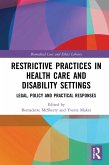A scene-setting case scenario at the start of each chapter describes the digital technology and identifies the sometimes competing interests of the key stakeholders. Broad themes of resource allocation, access to technologies, informed consent, privacy of health data and ethical concerns are considered in context, alongside analysis of legal duties owed by healthcare professionals to act in their patients' best interests.
This book addresses legal and ethical issues arising from the use of emerging digital health technologies and is of interest to academics, clinicians and regulators and anyone interested in the development of health technologies and the challenges they may present. It focusses on the Australian legal framework, with some comparison to other jurisdictions.
Dieser Download kann aus rechtlichen Gründen nur mit Rechnungsadresse in A, B, BG, CY, CZ, D, DK, EW, E, FIN, F, GR, HR, H, IRL, I, LT, L, LR, M, NL, PL, P, R, S, SLO, SK ausgeliefert werden.
Jane Kaye, Professor of Health, Law and Policy and Director of the Centre for Health, Law and Emerging Technologies (HeLEX) at University of Oxford
'Carolyn Johnston's book offers plain language insights into the complex and rapidly expanding world of digital health technologies. Consumers want the best, most convenient technologies to manage their health, yet clinicians may be wary of the traditional relationship power shifts and treatment efficacy concerns that result from the digital health care revolution.
Johnston explores eight new technologies and takes us back to the fundamentals of ethics, respect, humanity and evidence that should guide consumers, clinicians, regulators and society more broadly as this revolution unfolds. A timely scholarly contribution.'
Mark Cormack, Honorary Professor at the College of Health and Medicine, Australian National University (ANU)









